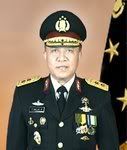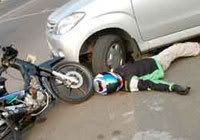POLRI - Indonesian National Police
POLRI, the Indonesian National Police, was incorporated into the armed forces in 1964 during the Sukarno era. Under Suharto steps were taken to militarise the Police by means of the National Defence Law of 1982 and the Police Law of 1997. As part of ABRI, the Police Force assumed all aspects of military structure, including ranks, budget, duties and even wage structure. The 1997 Law placed POLRI within the integral command structure of ABRI. On 01 April 1999, POLRI was separated from ABRI, the Indonesian armed forces. Although POLRI has been separated from ABRI, it remains under the jurisdiction of the Defence Minister, General Wiranto.
By 1993 POLRI was responsible for arresting and interrogating suspects, while a special POLRI force was responsible for dealing with street demonstrations. The BRIMOB (Brigade Mobil, Mobile Brigade), the most militarised force in POLRI, was trained to deal with mass demonstrations. Since the May 1998 upheaval, PHH (Pasukan Anti Huru-Hara, Anti Riot Unit) have received special anti-riot training.
Since 1945 Indonesia's National Police organization has been a national force, financed, directed, and organized by the central government. The strength of the national police force in 1992 was around 180,000. Its main duties were to maintain public order and security. Like the other armed services, the police considered themselves to be a social force active in national development, and therefore they participated in the armed services' civic missions.
The commander bore the title of police chief and was the highest ranking uniformed police officer in the nation. He was assisted by a deputy police chief. Police headquarters in Jakarta included a staff and several separate administrative bodies that handled specialized police functions. The police had its own territorial organization made up of seventeen jurisdictions, each of which was known as a Police Regional Command (Polda). Each Polda was administratively subdivided at the district, subdistrict, and village level. Polda Metrojaya, which had responsibility for the metropolitan Jakarta area, was subdivided into precincts, sections, and police posts. It was commonly referred to as the Jakarta Raya Metropolitan Regional Police.
Each Polda had its headquarters in a provincial capital and was assigned police units varying in strength and composition according to the needs dictated by the characteristics of the area. These forces were organized as city police forces or rural units and were under the operational command of the Polda commander, who in turn was directly responsible to national police headquarters. All police elements were charged with supporting the local government in their areas.
Functionally, the police were organized into a number of specialized elements. The largest of these was the uniformed police, which included both the general police, who performed conventional police duties relating to the control and prevention of crime and protection of property, and the traffic police, who patrolled the nation's roadways and supervised the licensing of drivers and the registration of motor vehicles. Also part of the uniformed force were the women police, who specialized in social matters and the welfare of women and children. Elite units of special police were employed to enforce order in terrorist situations beyond the capability of the regular forces. These units were better armed and more mobile than the general police and lived in separate barracks under more rigid discipline. These police wore the same uniform as other police but were distinguished by special badges.
A small unit of Sea and Air Police patrolled the national waters and airspace, providing tactical aid to other elements by regulating traffic, guarding against smuggling and the theft of fish, and supplying transport. The unit was also active in disaster relief. Its equipment included a few helicopters and light airplanes and various small seacraft.
Plainclothes police were assigned primary responsibility for criminal investigations, especially in complex cases or in cases involving several jurisdictions. They also handled forensics, intelligence, security, and the technical aspects of crime fighting, such as fingerprinting and identification.
One of the oldest National Police units was the Mobile Brigade, formed in late 1945. It was originally assigned the tasks of disarming remnants of the Japanese Imperial Army and protecting the chief of state and the capital city. It fought in the revolution, and its troops took part in the military confrontation with Malaysia in the early 1960s and in the conflict in East Timor in the mid-1970s. In 1981 the Mobile Brigade spawned a new unit called the Explosive Ordnance Devices Unit.
In 1992 the Mobile Brigade was essentially a paramilitary organization trained and organized on military lines. It had a strength of about 12,000. The brigade was used primarily as an elite corps for emergencies, aiding in police operations that required units to take quick action. The unit was employed in domestic security and defense operations and was issued special riot-control equipment. Elements of the force were also trained for airborne operations.
Police recruits were volunteers. Applicants were required to have at least a sixth-grade education and to pass a competitive examination. Other qualifications included physical fitness and good moral character. After three years' service as ordinary police, personnel with junior secondary-school diplomas could enter training to become NCOs. Those with three years' experience as NCOs were eligible for further training to enable them to become candidate officers and eventually enter the officer corps. Most higher ranking officers entered the force as graduates of the Police Division of Akabri.
Advanced training in vocational and technical subjects was available for regular police, for NCOs, and for officers. Promotions were often based on performance in advanced education. The Police Command and Staff School offered advanced training to police officers assigned to command units at the subdistrict, district, and Polda level. Training there focused on administration and logistics.









0 Response to "POLRI - Indonesian National Police"
Posting Komentar